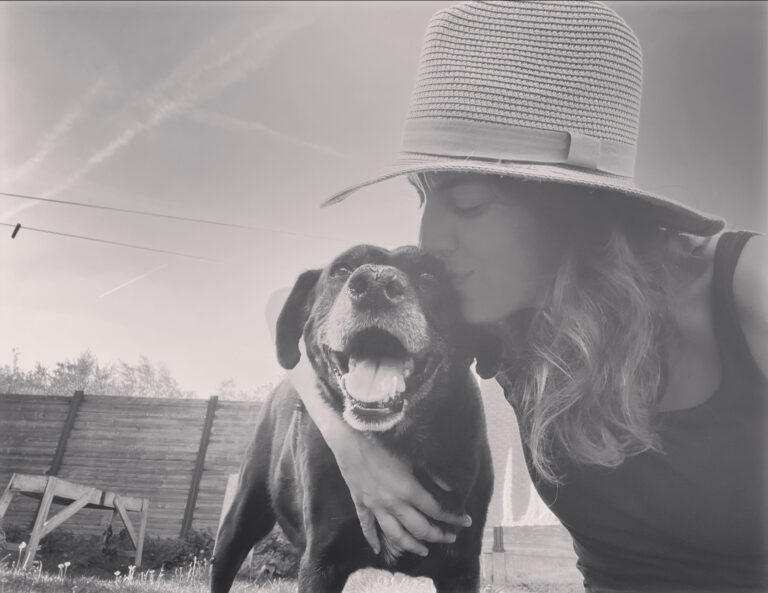Animal Behavior College’s Dog Obedience Instructor Program graduate publishes groundbreaking book on canine sensitivity and trauma
When Ineke Vander Aa made that first phone call to Animal Behavior College in 2010, standing under the glaring Arizona sun, she was filled with doubt. Was she smart enough? Would she fail? Could she justify the investment when her financial situation was far from stable?
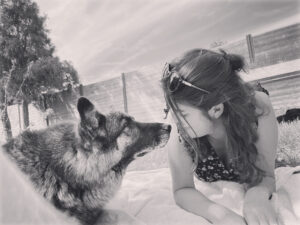 “I can’t guarantee that you’ll be successful,” the person on the phone told her, “But listening to you, I think it’ll be worth it to just give it a chance.”
“I can’t guarantee that you’ll be successful,” the person on the phone told her, “But listening to you, I think it’ll be worth it to just give it a chance.”
That leap of faith transformed into one of the most life-changing experiences of her life—and ultimately, into a career that’s now changing the lives of highly sensitive and traumatized dogs across Europe.
A Journey Fueled by Recognition and Compassion
As a highly sensitive person herself, Ineke recognized similar traits in the dogs she worked with. For years, she suppressed those observations, afraid of being accused of anthropomorphism. But as time went on, she noticed something crucial: these dogs didn’t respond well to classical conditioning techniques. Their brains were too overstimulated by daily life to be receptive to traditional training methods.
“Once I started treating these dogs as if they were highly sensitive—by focusing on their emotional health, the quality of their relationships and suitability of lifestyle and living environment—they started to thrive,” Ineke explains.
Her instincts were validated when the first scientific article about highly sensitive dogs was published. Encouraged by emerging research, she decided to specialize in providing therapeutic approaches for these unique animals, including dogs suffering from psychological trauma who develop similar heightened sensitivity to stress and chronic hypervigilance.
The ABC Foundation
Ineke credits much of her success to her training at Animal Behavior College and her mentorship with trainer Lisa Maldonado. “I owe so much of where I am today to ABC & Lisa,” she reflects. “The encouragement I received throughout my training really boosted the self-esteem I was lacking as a beginner.”
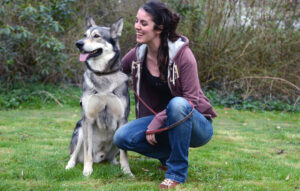
Beyond the comprehensive curriculum that gave her solid grounding in dog behavior, ABC provided something equally valuable: community. Lisa helped Ineke find her first job in the dog training world and stayed in touch long after graduation—a connection that sustained her even when unexpected circumstances forced
her to move back to her home country of Belgium.
“I was sad to leave this community I had come to love,” Ineke recalls. “But I left with the gifts of education and friendship.”
Building a Career Across Continents
Establishing herself as a positive reinforcement trainer in Belgium presented cultural challenges. Fueled by American values of hard work and persistence, Ineke found herself navigating a dog training landscape where harmful, outdated methods still dominated large segments of the professional community.
“My American experience helped me to stay grounded and true to what I felt was right, and to keep moving in that direction,” she says. Today, she’s part of a thriving community of dog lovers who advocate for kind and empathetic approaches to canine therapy and behavior.
Dogsitivity: From Personal Project to Required Reading
What began as a personal writing project to make sense of complex concepts has become required reading for dog behavior therapy courses across Belgium and the Netherlands. Dogsitivity, Ineke’s book on highly sensitive dogs, was initially written for herself and shared with clients. Their enthusiastic responses led to publication, and the book quickly gained recognition in the professional community.
One of Belgium’s leading dog behavior therapists, Geert de Bolster, contributed a piece on mindfulness with dogs; an endorsement that encouraged others in the field to take the topic more seriously. While one veterinary behaviorist challenged her work with concerns about anthropomorphism (attributing human emotions and characteristics to animals)—a conversation that prompted Ineke to think more deeply about the topic—she used that criticism constructively. “I can’t say she was wrong, but that didn’t make high sensitivity in dogs less real,” Ineke reflects. She revisited the subject and expanded on it in the revised edition. The professional community has largely responded with gratitude, embracing Dogsitivity as a valuable resource for understanding and helping challenging cases.
The revised edition of Dogsitivity is now available in English, making Ineke’s groundbreaking work accessible to a global audience.
Understanding the Highly Sensitive Dog
So what exactly makes a dog “highly sensitive”? According to Ineke, these dogs are born with brains that process information more intensely than average. They’re more sensitive to sensory input and more easily influenced by the moods of those around them. This heightened awareness can be an asset – contributing to talent as working dogs and the ability to connect deeply with others.
However, these same dogs tend to become easily overstimulated, leading to behaviors often labeled as reactive, aggressive, withdrawn, or even depressed. “When a guardian is informed about the needs of the highly sensitive dog, his strengths and his vulnerabilities, a suitable lifestyle and living environment can be created where the dog’s mental health can restore and grow,” Ineke explains.
Understanding high sensitivity, she argues, is the gateway to a higher quality of life for both the dog and their family.
Advice for the Next Generation
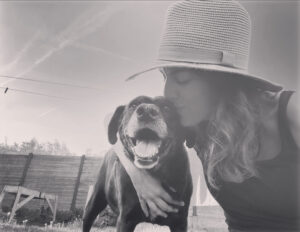 For current ABC students just starting their journey, Ineke offers wisdom born from experience: “This is your path. Your life. You’ve chosen to spend it alongside dogs, and I would encourage you to stay by their side. Not in front of them, not behind them. Keep moving steadily alongside them.”
For current ABC students just starting their journey, Ineke offers wisdom born from experience: “This is your path. Your life. You’ve chosen to spend it alongside dogs, and I would encourage you to stay by their side. Not in front of them, not behind them. Keep moving steadily alongside them.”
She emphasizes the importance of continuous learning – recognizing that no one owns a single truth about dogs – while also learning directly from the animals themselves.
“On the other side, watch the dogs. If you allow them, they will lead the way and bring you home. They always do.”
Her message to those hesitating at the starting line? Silence the outside voices telling you that you’re not enough and give yourself a chance. “It turned out to be one of the most life-changing experiences I ever had. Man, I’m glad I made that phone call.”
What’s Next
Today, Ineke continues to work with clients experiencing challenges with highly sensitive and traumatized dogs, though her time is limited by her other ventures – a goat sanctuary, dog rehoming organization, and cat hotel. She accepts clients primarily through referrals from colleagues in the field.
But the pull of the pen remains strong. “I do feel the pull of my pen, so I might be returning to a new book project about dogs soon,” she hints.
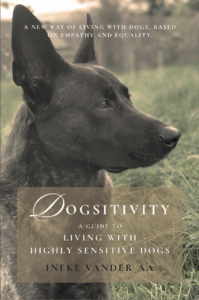
Learn More:
Dogsitivity is available wherever books are sold. For detailed information about the book and Ineke’s work, visit www.dogsitivity.com or follow @dogsitivity on Instagram.
About Animal Behavior College:
Animal Behavior College has been training professional dog trainers, veterinary assistants, pet groomers, and cat trainers since 1998, combining online education with hands-on mentorship to prepare students for successful careers working with animals.


